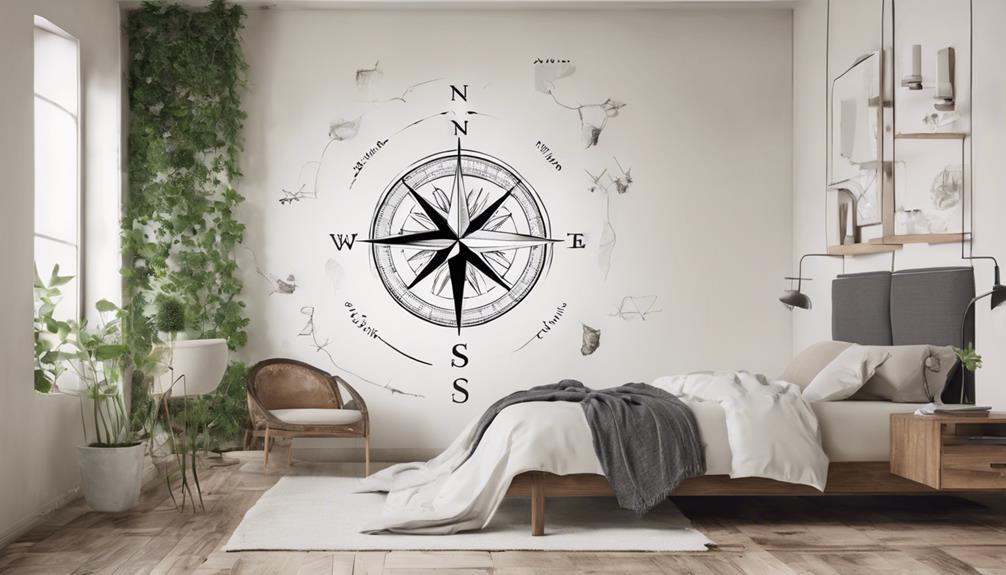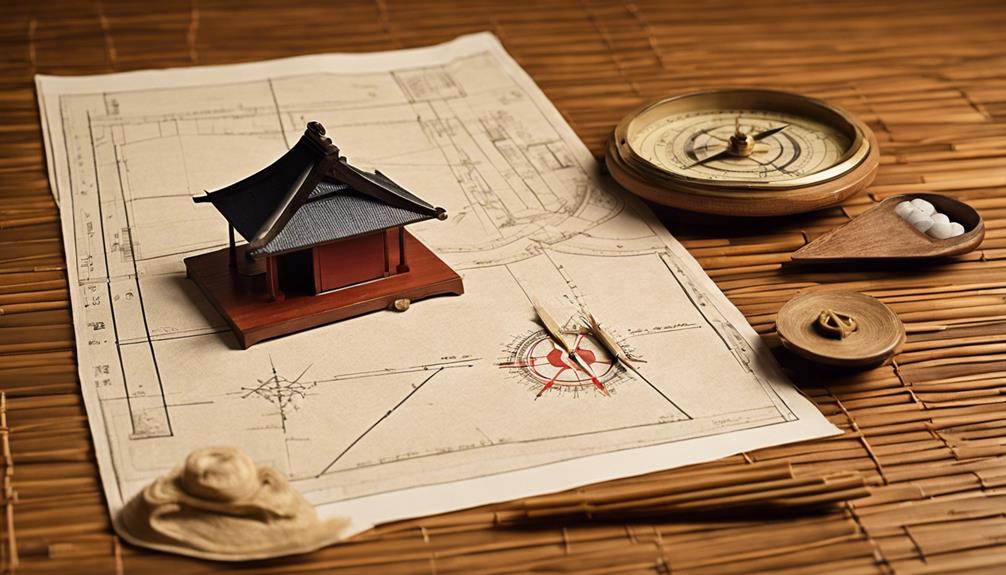Unveil the secrets of determining your room's Feng Shui direction to enhance wealth, health, and relationships in your living space.

How to Determine Feng Shui Direction of a Room
Determining the direction of a room with finesse and precision is fundamental in Feng Shui. As you venture into this ancient Chinese practice, you might wonder how the aspect of your room can impact the energy flow within your living space.
Is your bedroom in the wealth or health sector? Does your kitchen tap into the relationship or creativity sector? These are questions that, once answered, will significantly enhance your understanding of Feng Shui and its effects on your life.
But how do you get these answers? Stay tuned.
Key Takeaways
- Use a calibrated compass from the room's center, pointing towards the entrance, to determine the room's Feng Shui direction.
- Avoid magnetic disturbances for an accurate compass reading and double-check for precision.
- Document the compass reading to guide future Feng Shui applications in the room.
- Apply Feng Shui principles such as color choices, harmonious furniture placement, and clutter avoidance based on the room's direction.
Understanding the Basics of Feng Shui

To really grasp the concept of Feng Shui, you've got to understand its roots in ancient Chinese philosophy and its practical application in harmonizing everyone with their surrounding environment. The origins of Feng Shui stem from a deep respect and understanding of the natural world. It's not just about furniture placement and room direction, it's about balancing energies to create harmony and peace.
Feng Shui's origins are steeped in the belief that the land, the heavens, and humanity are interconnected. It's the art of aligning your environment in such a way that positive energy, or 'Qi', can flow freely. When your surroundings are in harmony with the natural world, it's believed that you'll experience more positivity in your life.
Balancing energies is an integral part of this practice. You've got to understand that everything in the world has energy, and this energy can be either positive (Yang) or negative (Yin). By arranging your environment to balance these energies, you're creating a space where you can thrive.
Importance of Room Direction in Feng Shui

Why is room direction so crucial in Feng Shui, you might be wondering? Well, it's all about the Energy Flow Impact. Feng Shui is based on the principle that energy, or "chi", flows through your living space, impacting your life quality. The direction your room faces can significantly affect this flow, and consequently, your well-being and prosperity.
Here are some Feng Shui Benefits of room direction:
| Room Direction | Energy Flow Impact | Feng Shui Benefits |
|---|---|---|
| North | Calm, Fluid | Promotes Career Growth |
| South | Warm, Energetic | Enhances Reputation |
| East | Bright, Uplifting | Boosts Health and Family Ties |
| West | Calm, Reflective | Encourages Creativity and Children's Luck |
Ultimately, understanding room direction helps you harness the positive energy and deflect the negative, creating a balanced and harmonious environment. It's about making your space work for you, enhancing different aspects of your life. Whether it's your career, health, or relationships, the right room direction can bring about significant improvements. So, don't underestimate the power of room direction in Feng Shui. It's a simple yet effective tool for achieving a better, happier, and more prosperous life.
Tools for Determining Room Direction

Now that you understand the importance of room direction in Feng Shui, let's dive into the practical tools you can use to accurately determine this vital aspect. The primary tool is a compass, an ancient navigational instrument that aligns itself to the Earth's magnetic field. But before you start, compass calibration is essential. This process ensures your compass is set correctly to give you accurate readings.
Compass calibration is quite straightforward. You simply need to adjust your compass according to the magnetic declination of your location. Magnetic declination is the difference between true north and magnetic north, and it varies depending on where you're on Earth. There are multiple online tools available to help you figure out the correct declination for your location.
But what about magnetic disturbance? This is a key factor to consider. Various objects can disrupt the magnetic field like electronic devices, metal objects, or even certain types of stone. You'll want to avoid these disturbances when using your compass to ensure the most accurate reading. If you're not careful, these disturbances could skew your Feng Shui analysis, thus affecting the harmony of your space.
Step-by-Step Guide to Finding Your Room's Direction

Ready to pinpoint your room's direction? Let's get started with this simple, step-by-step guide that will help you apply the principles of Feng Shui accurately and effectively.
First, let's clear some Feng Shui misconceptions. Many believe it's a complicated process, but it doesn't have to be. With proper compass reading techniques, you can easily find your room's direction.
Here is a simplified guide:
| Steps | Description |
|---|---|
| 1 | Stand in the center of the room with your compass. |
| 2 | Hold the compass level and point it towards the main entrance. |
| 3 | Read the compass needle. The direction it points is your room's direction. |
| 4 | Double-check by pointing the compass to another part of the room. |
| 5 | Document the reading for future reference. |
Remember, it's crucial to hold the compass level to get an accurate reading. Also, avoid being near large metal objects as they may interfere with the compass' magnetic field.
Now, equipped with the right knowledge and tools, you're ready to apply Feng Shui principles to your space. Stay tuned for our next topic: 'Applying Feng Shui Principles Based on Room Direction'.
Applying Feng Shui Principles Based on Room Direction

Once you've determined your room's direction, it's time to dive into the heart of Feng Shui – applying its principles to harmonize your space. Now, here's where Feng Shui colors and harmonizing furniture come into play. Each cardinal direction, according to Feng Shui, has corresponding colors that channel specific energies.
For instance, if your room faces north, water-related colors like blues or blacks can promote calmness and clarity. When your room is south-facing, it's all about fire, so opt for reds and pinks. East and southeast rooms thrive with wood elements, so greens and browns are your go-to. West and northwest rooms? Earth and metal elements dominate, so think whites, grays, yellows, or earthy tones.
Harmonizing furniture involves arranging your pieces in a way that encourages a free flow of positive energy, or 'chi'. For instance, place your bed or desk in a 'commanding position', where you can see the door but not directly in line with it. Make sure there's plenty of open space and avoid clutter.
Frequently Asked Questions
What Are Common Mistakes People Make When Trying to Determine the Feng Shui Direction of a Room?
You might misinterpret the room's layout, leading to misinterpretation consequences.
It's easy to assume the room's direction based on the home's orientation, which is often inaccurate.
You may also make inaccurate measurements, neglecting the importance of precision in feng shui.
Moreover, overlooking the impact of surrounding elements, such as nearby bodies of water or hills, is another common mistake.
Ensuring accurate interpretation and measurements is key to obtaining the right feng shui direction.
How Do You Correct a Room's Feng Shui if It's Facing the Wrong Direction?
If you find your room's facing the wrong direction for good Feng Shui, don't worry. You've got options. Use Feng Shui mirrors to redirect energy flow. They're powerful tools that can shift a room's dynamic.
Also, consider the color impact. Color can alter a room's energy dramatically. Warm hues energize, cool ones calm. Adjust these elements to balance energy in your space.
Are There Specific Feng Shui Principles for Different Rooms in a House?
Yes, there are specific feng shui principles for each room. Room arrangements and color significance are key elements.
For instance, your kitchen should have fiery colors like red, while your bedroom should have earthy tones for relaxation. Each room's direction also matters.
Is There a Best Time of Day to Determine a Room's Feng Shui Direction?
There isn't a specific time of day that's best to determine a room's directional accuracy for Feng Shui. You're free to use a compass anytime, as long as there's enough light.
Just make sure you're standing in the center of the room and not near any large metal objects that could interfere with the compass.
It's more about where you measure from, not when.
Can Feng Shui Principles Be Applied to Outdoor Spaces Like Gardens or Patios?
Absolutely, you can apply Feng Shui principles to your outdoor spaces. It's all about creating a harmonious flow of energy.
By considering Feng Shui landscaping, you're enhancing the outdoor energy flow. Consider the arrangement of plants, the placement of furniture on your patio, and even the direction of water in a fountain.
It's not just about aesthetics, but also about creating a positive and calming environment.
Conclusion
Understanding your room's Feng Shui direction is crucial for harmonizing energy flow. By using tools like a compass or smartphone app, you've learned how to find this direction.
Now, apply Feng Shui principles accordingly to enhance positivity and prosperity. Remember, Feng Shui isn't a one-size-fits-all approach. It's about creating balance and synergy in your space.
So, tweak the principles to suit your comfort and lifestyle, making your home a haven of tranquility.



Sign up